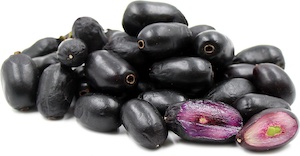Jamun tree or The Syzygium cumini tree, commonly referred to by its regional name, is a majestic, tropical evergreen native to the Indian subcontinent. Known for its resilience, it flourishes in a variety of conditions, making it a common sight in diverse landscapes, from coastal regions to mountainous terrains. This tree can reach heights up to 30 meters, characterized by its broad, spreading crown of lush, leathery leaves that provide ample shade.
The tree is of great socio-economic value, particularly for the delicious fruit it bears. The fruit has a deep purple color and a unique taste, a blend of sweet and tangy flavors with a hint of astringency. Apart from being a popular seasonal delicacy, it also finds use in making wines, vinegar, and other culinary products.
Medicinally, every part of the tree has been utilized in traditional healing systems, including Ayurveda. Its leaves, bark, and seeds are packed with bioactive compounds that offer various health benefits. From treating diabetes and digestive disorders to promoting oral and heart health, the tree serves as a beacon of wellness.
The Syzygium cumini tree is an environmental and health boon, enhancing biodiversity while offering a rich pharmacy of natural medicine.
Ayurveda Medicinal Properties of Jamun Fruit
Texts of ayurveda explain the medicinal properties of jamun fruit or Jawa plum as follows

It is sweet ( Madhura rasa), astringent ( Kashaya rasa) and sour ( amla rasa ) to taste. After digestion, it acquires a pungent taste ( katu rasa). It is light ( laghu) to digest and dries up the body tissues ( ruksha). It acts as a body coolant ( sheeta veerya). It balances Pitta and Kapha. But increases vata.
When this fruit is used along with other herbs like haritaki, amla, gudmar, vijaysar and fenugreek seeds, it effectively helps in the management of blood sugar levels. Moolika Ayurveda Diasol Capsules contain all these herbs and it is the best ayurvedic medicine for diabetes.
Jamun Fruit for Diabetes
The Jamun fruit tree, often referred to as the Indian blackberry, yields a distinct deep-purple fruit that is not only enjoyable for its unique taste but is also recognized for its remarkable health benefits, especially in managing diabetes.
According to the principles of Ayurveda since it balances Kapha it helps in the management of madhumeha ( diabetes).
This fruit is rich in anthocyanins, a type of flavonoid that has powerful antioxidant properties. These antioxidants help to reduce oxidative stress, a known factor in the development and progression of diabetes. They also help to prevent damage to the pancreatic cells, the cells responsible for insulin production, thereby promoting healthy insulin levels and blood sugar control.
The seeds of the fruit have been used traditionally in Ayurveda for managing diabetes. They contain a biochemical known as jambosine. Scientific studies have indicated that jambosine can inhibit the conversion of carbohydrates into sugars, thereby helping to regulate blood glucose levels. This is particularly beneficial for individuals with type 2 diabetes, a condition characterized by insulin resistance and high blood glucose levels.
Moreover, the fruit is high in dietary fiber. This fiber slows down the absorption of sugar into the bloodstream, thus avoiding spikes in blood glucose.
Regular consumption of the Indian blackberry fruit, as part of a balanced diet, may therefore offer an effective natural strategy to support the management of diabetes. It’s crucial, however, to consume it in moderation and consult with a healthcare professional, especially for those under medication for diabetes.
Lastly, it’s important to note that more research is needed to fully understand the potential benefits and mechanisms involved in these effects.
Benefits of Jamun Seeds for Weight Loss
The Jamun fruit has a unique feature – its seeds, which can play a vital role in the management of certain health conditions. They have been extensively studied and are particularly noted for their potential in diabetes control and weight management.
Type-2 diabetes is characterized by elevated blood sugar levels, caused by insulin resistance or the inability of the pancreas to produce enough insulin. A bioactive compound called jambosine, found in the seeds, has shown promising effects in controlling blood sugar levels. This alkaloid inhibits an enzyme responsible for converting starch into sugar, therefore, reducing the overall blood glucose levels. The ground seeds can be consumed directly or infused into teas, which can be part of a dietary regimen for diabetics (Mukherjee, P.K., et al., 2006).
In addition to diabetes management, these seeds could aid in weight loss. They are rich in fiber, which contributes to a feeling of satiety, reducing overall calorie intake. Furthermore, the presence of other bioactive compounds may assist in increasing the metabolic rate, leading to a higher energy expenditure. Consequently, the body might start using stored fat for energy, contributing to weight loss.
However, it’s essential to remember that while the seeds offer potential benefits, they should be used as part of a balanced diet and not as a standalone solution. Consulting with a healthcare professional before starting any new health regimen is always advisable.
In conclusion, the seeds from the fruit of the Syzygium cumini tree could be a natural, beneficial supplement for individuals with diabetes and those seeking to manage their weight. The tree, therefore, is more than just a source of shade and tasty fruits; it’s a provider of potential health solutions.
Reference:
Mukherjee, P. K., & Wahile, A. (2006). Integrated approaches towards drug development from Ayurveda and other Indian system of medicines. Journal of ethnopharmacology, 103(1), 25-35.
Mukherjee, P.K., Maiti, K., Mukherjee, K., Houghton, P.J. (2006). Leads from Indian medicinal plants with hypoglycemic potentials. Journal of Ethnopharmacology, 106(1), 1-28.


